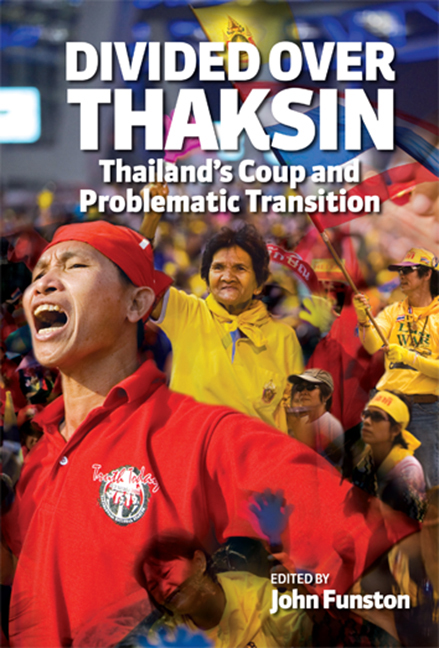Book contents
- Frontmatter
- Contents
- List of Tables and Figures
- List of Contributors
- Preface
- Introduction
- 1 Political Contests in the Advent of Bangkok's 19 September Putsch
- 2 The Tragedy of the 1997 Constitution
- 3 The NESAC, Civil Society, Good Governance and the Coup
- 4 Military Coup and Democracy in Thailand
- 5 Deconstructing the 2007 Constitution
- 6 Thailand's 2007 Constitution and Re-Emerging Democracy: Will Political Polarization Continue?
- 7 Untying the Gordian Knot: The Difficulties in Solving Southern Violence
- 8 Another Country: Reflections on the Politics of Culture and the Muslim South
- 9 Governance in the South: Is Decentralization an Option?
- 10 Tradition and Reform in Islamic Education in Southern Thailand
- 11 The Economy under the Thaksin Government: Stalled Recovery
- 12 The Thai Economy after the Coup
- 13 The Impact of Political Uncertainty on Business
- Index
7 - Untying the Gordian Knot: The Difficulties in Solving Southern Violence
Published online by Cambridge University Press: 21 October 2015
- Frontmatter
- Contents
- List of Tables and Figures
- List of Contributors
- Preface
- Introduction
- 1 Political Contests in the Advent of Bangkok's 19 September Putsch
- 2 The Tragedy of the 1997 Constitution
- 3 The NESAC, Civil Society, Good Governance and the Coup
- 4 Military Coup and Democracy in Thailand
- 5 Deconstructing the 2007 Constitution
- 6 Thailand's 2007 Constitution and Re-Emerging Democracy: Will Political Polarization Continue?
- 7 Untying the Gordian Knot: The Difficulties in Solving Southern Violence
- 8 Another Country: Reflections on the Politics of Culture and the Muslim South
- 9 Governance in the South: Is Decentralization an Option?
- 10 Tradition and Reform in Islamic Education in Southern Thailand
- 11 The Economy under the Thaksin Government: Stalled Recovery
- 12 The Thai Economy after the Coup
- 13 The Impact of Political Uncertainty on Business
- Index
Summary
In We Have Never Been Modern, Bruno Latour maintains that the intellectual culture in which we live does not know how to categorize. Using different labels such as science, society and technology, there have always been attempts to “retie the Gordian knot” by criss-crossing the divide that separates exact knowledge and the exercise of power. Here I am not moving along Latour' corridor using the Gordian knot as a metaphor for the beginning but rather in its conventional way of solving a difficult problem, so it is not “retying” but “untying the Gordian knot”.
But then anyone who is remotely familiar with this Greek legend will certainly notice the “mistake” in my title since it is generally believed that the knot cannot be untied; it needs to be cut. Alexander the Great demonstrated that. The “mistake”, however, is intentional because the thesis here will be to prove that Alexander, great as he is, is indeed wrong when it comes to political policy dealing with ethnic majority/minority relations because the Gordian knot cannot be cut but untied — as in the southern Thailand case and perhaps elsewhere in the world. I will return to Alexander later.
THE NRC REPORT AND RECENT DEVELOPMENTS
Let me begin, however, with a few words about my work with the National Reconciliation Commission (NRC) headed by former Prime Minister Anand Panyarachun. The final NRC report was released on 5 June 2006, but unfortunately it came at a time when Thailand was undergoing acute political conflict at all levels. The report was a victim of that. The government of Prime Minister Thaksin Shinnawatra paid little attention to it. After the 19 September coup, when General (Ret) Surayud Chulanont became prime minister, especially during the first six months, he seemed to have done some things in line with NRC suggestions, including going down to the south and offering his apology to victims of violence. He also initiated some policies which underscored the use of reconciliation and nonviolent methods, though there are questions about how much progress has been made on the ground especially following the increasing use of government forces in recent months. What did the NRC report say? Among other things, Chapter IV contains the NRC' prognosis of the situation.
- Type
- Chapter
- Information
- Divided Over ThaksinThailand's Coup and Problematic Transition, pp. 96 - 109Publisher: ISEAS–Yusof Ishak InstitutePrint publication year: 2009

